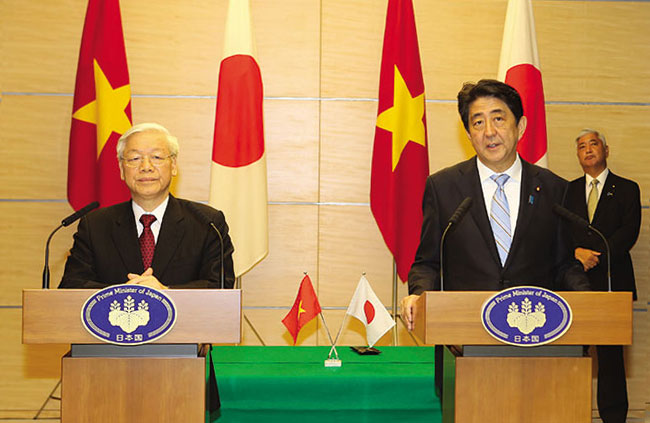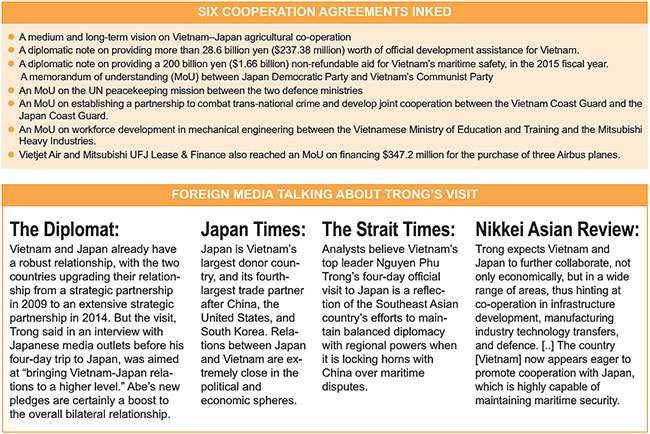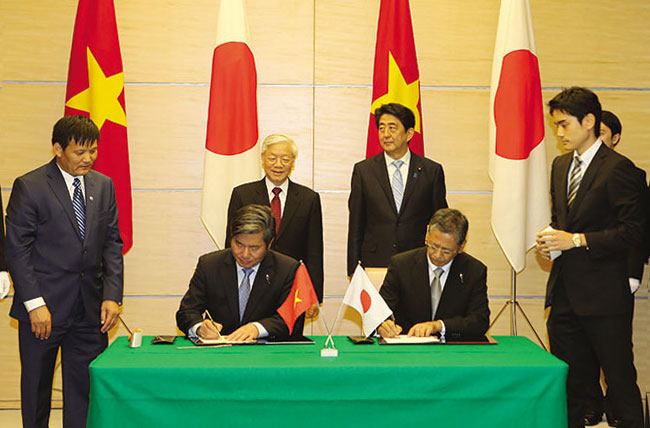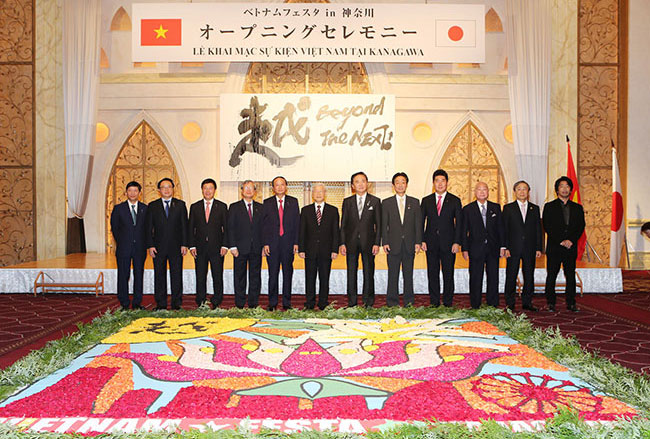Partners build upon long-standing friendship

Party General Secretary Trong and Prime Minister Abe secured a sweeping range
of co-operative initiatives-Photo: VNA
During Party General Secretary Nguyen Phu Trong’s official visit to Japan last week, the first to this nation by the leader of the Vietnamese Communist Party since April 2009, Prime Minister Shinzo Abe stated that “I would like to extend a heartfelt welcome to the top leader of Vietnam and an old friend to Japan. I place importance on our relations with Vietnam.
“General Secretary Trong and I share the view that we will further expand the friendly and co-operative relations between our two countries. We produced a major outcome in the form of a joint vision statement that lays out a direction for bilateral co-operation,” he stressed.
Trong stated that “The relations between Vietnam and Japan are not only the extensive strategic partnership, but also those of heartfelt friends. My visit to Japan is aimed to comprehensively boost and further sharpen the two countries’ ‘Extensive Strategic Partnership for Peace and Prosperity in Asia’, with the focus on strengthening political trust, expanding and solidifying economic connectivity and co-operation, and further cementing co-operation in regional and international issues of mutual concern.”
The two sides affirmed their strong determination to deepen the comprehensive partnership in all areas.
This visit witnessed the signing of a raft of co-operation agreements (see table).

Boosting economic, trade, and investment co-operation
According to the joint vision statement, the two countries’ bilateral co-operation in security and defense, agriculture, science-technology, education-training, culture, sports, tourism, environment, local-level exchanges, and people-to-people exchanges has quantitatively and qualitatively developed.
Regarding connecting economic development strategies, Japan affirmed its assistance for Vietnam to enhance competitiveness, transform the growth paradigm, implement Vietnam’s industrialisation strategy within the Japan–Vietnam co-operation framework until 2020, with a vision to 2030, and launch the 6th phase of the Vietnam-Japan joint initiative at an early date to improve the business environment, with a view to strengthening Vietnam’s competitiveness.

On connecting production capacity, the two sides agreed to:
- Enhance development cooperation in combination with the transfer of advanced technology in high-tech areas;
- Promote co-operation in energy development and the electronics industry, information and communications technology, and postal services;
- Boost investment flows into Vietnam from Japanese firms, including small and medium-sized enterprises (SMEs);
- Strengthen the co-operation between Japanese and Vietnamese companies in agriculture, and work together to foster Vietnam’s SMEs and to promote the development of supporting industries in order to facilitate local procurement by Japanese companies operating in the country;
- Diversify forms of investment, with encouragement given to private-public partnership;
- Promote the development of manufacturing engineering, and to build up and develop large-scale industrial parks for Vietnam;
- Promote an innovative business environment through co-operation in the area of intellectual property;
- Promote comprehensive co-operation in agriculture, forestry, and fishery in the spirit of “Japan-Vietnam medium-long term vision on agricultural cooperation”;
- Promote direct co-operation between localities of both countries.
On this occasion, Abe pledged some $835 million in loans for Vietnam to build ports and expressways.
Currently, Japan is Vietnam’s biggest bilateral official development assistance (ODA) donor, which occupies 30 per cent of total international ODA for Vietnam. In July 2015, Japan committed to considering ODA worth $3 billion for Vietnam in the fiscal year 2015. According to the statement, the two sides agreed to further co-operate to double their two-way trade and investment by 2020.
Abe said that Japan wanted to implement infrastructure construction projects in Vietnam, including the Long Thanh International Airport in Dong Nai province, energy development, including the Ninh Thuan 2 Nuclear Power Plant, and the development of specialised industrial parks in Haiphong city and Ba Ria-Vung Tau province.
“We welcome all Japanese enterprises to expand investment and business in Vietnam in the sectors of processing, manufacturing, construction and energy. I can say for sure that Vietnam’s Party, State, and people always create the best conditions for Japan’s enterprises to perform successfully in Vietnam,” Trong stressed.
As of August 20, 2015, Japan, which is Vietnam’s second largest foreign investor, had 2,725 valid investment projects in Vietnam, registered at $37.94 billion.
Last week also saw the lifting of prohibitions on both the exports of Japanese apples to Vietnam and Vietnamese mangos to Japan. Japan also extended Vietnamese citizens’ commercial visa to 10 years.
Japan is currently Vietnam’s fourth largest trade partner. The two countries’ trade turnover reached $27.62 billion last year, up 9.4 per cent on year. The figure hit nearly $14 billion in this year’s first half.

Solidifying military co-operation
The two leaders agreed to strengthen co-operation in security and defense by promoting visits and interactions at various levels, and actively coordinating to implement bilateral security and defense agreements.
Abe committed that Japan would provide more used vessels to shore up Vietnam’s maritime law enforcement capabilities.
“The two sides expressed their serious concerns over recent and ongoing developments in the South China Sea [known as East Sea for Vietnam], including large scale land reclamation and the building of outposts, which have increased tensions, eroded trust and confidence, and threatened peace and stability in the region and the world,” the statement stated.
The two sides also reiterated the importance of maintaining peace, maritime security and safety, and freedom of navigation and over-flight, and urged parties concerned not to take any unilateral actions that would complicate and expand the disputes in the East Sea; to settle all disputes by peaceful means on the basis of the principles of international law and, particularly, the UN Convention on the Law of the Sea; to strictly implement the 2002 Declaration on the Conduct of Parties in the South China Sea; and to conclude the Code of Conduct in the South China Sea expeditiously.
What the stars mean:
★ Poor ★ ★ Promising ★★★ Good ★★★★ Very good ★★★★★ Exceptional
Latest News
More News
- Japanese business outlook in Vietnam turns more optimistic (January 28, 2026 | 09:54)
- Foreign leaders extend congratulations to Party General Secretary To Lam (January 25, 2026 | 10:01)
- 14th National Party Congress wraps up with success (January 25, 2026 | 09:49)
- Congratulations from VFF Central Committee's int’l partners to 14th National Party Congress (January 25, 2026 | 09:46)
- 14th Party Central Committee unanimously elects To Lam as General Secretary (January 23, 2026 | 16:22)
- Worldwide congratulations underscore confidence in Vietnam’s 14th Party Congress (January 23, 2026 | 09:02)
- Political parties, organisations, int’l friends send congratulations to 14th National Party Congress (January 22, 2026 | 09:33)
- Press release on second working day of 14th National Party Congress (January 22, 2026 | 09:19)
- 14th National Party Congress: Japanese media highlight Vietnam’s growth targets (January 21, 2026 | 09:46)
- 14th National Party Congress: Driving force for Vietnam to continue renewal, innovation, breakthroughs (January 21, 2026 | 09:42)
















 Mobile Version
Mobile Version